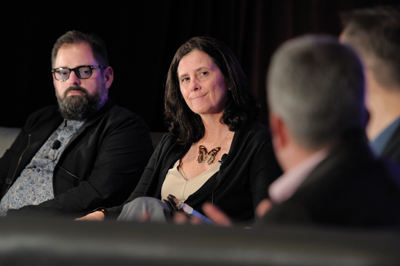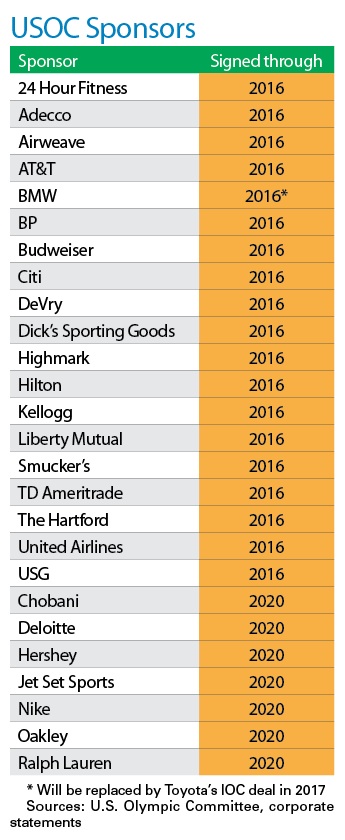 |
USOC sponsorship sales are ahead of the last quadrennial, says CMO Lisa Baird.
Photo by: DAVID LUBARSKY
|
The U.S. Olympic Committee’s sponsorship portfolio has never looked stronger, but the group’s marketing division nonetheless has its work cut out for it as an Olympic year begins.
Just seven of the 26 Team USA domestic sponsors have agreed to deals beyond the coming Rio Games. None of the rest have said publicly they will leave of their own volition, but 18 still must be renewed for the 2017-20 quadrennial, including Olympic stalwarts Budweiser, AT&T and Kellogg — and the circumstances are challenging.
“We’re ahead of where we were at this time heading into 2013-2016, but [2016] is definitely the time we want to close the renewals,” said USOC chief marketer Lisa Baird.
One prominent partner will definitely not be coming back. German automaker BMW, which has had a six-year deal in the mobility category, will be replaced in 2017 by Toyota, which signed a superseding deal in March for worldwide rights with the International Olympic Committee.
In the Olympics business, long-term renewals are crucial to generate revenue between Games, and budgets are done in four-year cycles. For the upcoming cycle, renewals are frustrated on two fronts, Baird acknowledged: Los Angeles’ bid to host the 2024 Games, and the geography of the three Olympics following Rio: Pyeongchang, South Korea, in 2018; Tokyo in 2020; and Beijing in 2022.
Anticipating the unfriendly time zones for America, the USOC is trying to create more domestic properties for sponsors to use, such as the recent Team USA Awards in Philadelphia, the city-to-city Road to Rio campaign and potentially new competitions. “Time zones are an element,” Baird said. The USOC also signed a deal with Japanese advertising giant Dentsu to help solicit deals from Asian companies that might want to buy American Olympic rights.
 |
The Los Angeles bid is also tricky. While the entire American Olympic movement stands to benefit immensely if it succeeds, IOC marketing rules create a challenging dynamic for sales at this stage in the process. If L.A. wins the IOC vote in September 2017, all U.S. Olympic marketing rights from the conclusion of the 2020 Tokyo Games through 2024 would be owned by a joint venture of the Los Angeles Games organizers and the USOC. That new joint venture could begin selling in open categories immediately, and any existing USOC sponsor would have to renew through negotiations with the joint venture in, presumably, much more expensive competitive bidding.
“We have to give as much of a clean slate as we can to the city, without unduly harming the [national Olympic committee],” Baird said.
That doesn’t mean deals can’t be done, but current negotiations have to contemplate two widely diverging futures: one with the L.A. Games and one without. The L.A. bid committee believes it can make at least $1.44 billion in domestic sponsorship sales, more than four times the $313 million in marketing rights and licensing royalties reported by the USOC during the 2009-12 quadrennial.
“It just becomes a little more complex,” Baird said.
Whatever lies ahead, the last three years have been an unalloyed sales success for the USOC. Since the 2012 London Games, the USOC has signed five new sponsors from a spectrum of industries, including Dick’s Sporting Goods, mattress top maker Airweave, building supplies company USG, and two virtually ubiquitous grocery store brands: the J.M. Smucker Co. and Hershey Co. (Hershey’s initial deal runs through 2020; the others must be renewed for post-Rio.)
At this point in 2012, the USOC had signed two new sponsors and secured two renewals. Four years before that, heading into the Beijing Games, it had added one new sponsor, lost one and had no renewals.
Through this current quadrennial’s halfway point in 2014, the USOC had already booked $185 million in sponsorship revenue, nearly 65 percent of its total for the previous, recession-dominated quadrennial. The financials for 2015 are not yet public, but CEO Scott Blackmun said the trend has continued.
Blackmun said total revenue for the 2013-16 quadrennial is projected to jump 17 percent over the period that ended with London.
“If you look at it in the case of aggregated revenue, if you compare the end of 2015 to the end of 2011, we’re doing very, very well by comparison,” Blackmun said. But, he added: “2016 is going to be an important year for us.”
“We’ve got a handful of categories we’re going to focus on in the early part of the year,” Blackmun said. “We have obviously some goals and some key existing relationships, and we hope to renew a lot of those.”
The USOC, like all national Olympic committees, also signs marketing pacts with the IOC’s rights partners and receives revenue from those deals. All 12 current worldwide rights holders are signed through at least 2020, with three signed through 2024.





